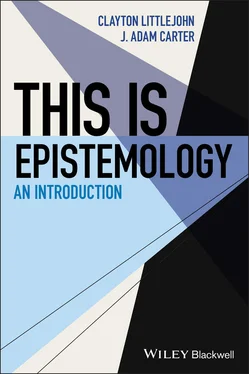7 7For a discussion of the principle (under a less snazzy name), see Goldman (1999b, p. 2).
8 8The gist of the idea would be to, first, find some feature, F, that B1 has but B2 doesn't have, which could plausibly account for why B1, but not B2, is justified. Next, extrapolate from this difference between B1 and B2 to generate a rule, framed with reference to F, that looks something like this: “Include all and only beliefs with feature F in Your Book of Justified Beliefs.”
9 9What does “adequate” mean? A piece of evidence might provide some support for a belief without providing adequate support for a belief. We might say that a piece of evidence, E, supports your belief in p if adding E to your set of evidence increases p's probability. If the increase is very small, the evidence might support p without providing adequate support. The observation that someone is about to swim laps is some evidence that they'll drown and the observation that someone has been handed a lottery ticket is some evidence that they'll soon be rich. These observations increase the probability of the relevant beliefs ever so slightly. They don't provide an adequate basis for belief, however. We will discuss this further in the chapter on inference.
10 10Typically, skeptics about epistemic justification (particularly those persuaded by the kind of regress argument we are discussing in this chapter) have embraced not only the contingent, descriptive thesis that no beliefs are justified, but, even more, the necessary, modal thesis that epistemic justification is impossible. For the present purposes, we'll sidestep this distinction – for the contingent descriptive thesis that no beliefs are justified suffices for at least one interesting kind of skepticism – and return to it in Chapter 11.
11 11Interestingly, many of the philosophers associated with the doctrine of skepticism about epistemic justification would be disinclined to say that they know or even justifiably believe the doctrine to be true. Pyrrhonian skeptics typically were led, through argument, to a position called equipollence, which involved withholding assent entirely, on either all propositions (as in the case of rustic Pyrrhonians) or on controversial propositions (as in the case of urbane Pyrrhonists). Academic skeptics were more inclined to assert philosophical doctrines (such as the thesis that skepticism about epistemic justification is true); however, as Michael Frede (1998) has noted, even these bolder skeptics were often disinclined to say they knew the truth of their own skeptical doctrine, even if (unlike Pyrrhonian skeptics) they were inclined to assert the theses.
12 12See, most notably, Sextus Empiricus' Outlines of Pyrrhonism (1976). Unlike the radical skeptic of Descartes' Meditations who denies that any of our beliefs are known, the Pyrrhonian skeptic denies that beliefs even attain the status of being justifiably held. For some helpful contemporary discussion of how to interpret the Pyrrhonian's controversial epistemological thesis, see Burnyeat and Frede (1997) and, in particular, Barnes (1998) and Frede (1998). Cf. Fine (2000) for related discussion concerning the distinction between Cartesian and Pyrrhonian skepticism.
13 13See, for example, Turri and Klein (2014, p. 3).
14 14It is possible to be a skeptical infinitist by insisting that the structure of justification is as the infinitist says it is, and then to submit further that this structure is not instantiated in any human mind. See, for example, Aikin (2005). For our purposes, we will be discussing only non‐skeptical infinitism.
15 15This is a paraphrased reconstruction of the argument as stated initially by Turri and Klein (2014, p. 3).
16 16That's not to say there are not various in‐house disputes between coherentists and foundationalists that lead some coherentist and foundationalist views to end up looking very different from one another.
17 17This line of reply is briefly canvassed by Sosa (1980, p. 10).
18 18Recall that in attempting to come up with a method for determining which entries in Your Book of Beliefs should be included in Your Book of Justified Beliefs, you are in the main searching for some feature which could potentially serve to distinguish the justified from the unjustified beliefs; the feature of being justified by further beliefs is but one such candidate potential feature. As we'll see in Section 1.5, foundationalists are disinclined to think the feature of being justified by further beliefs is the feature we should be looking for.
19 19The sense of “availability” at issue here will be of relevance to the viability of infinitism; we engage with this point later in this section.
20 20For presentational purposes, we are setting aside the contested question of what basing a belief on a reason involves. Some philosophers think it is a matter of a reason causing your belief. Others think it is a matter of having beliefs about your reasons supporting your beliefs. Others still take the notion to be a theoretical primitive. See Korcz (2015) for an overview and Carter and Bondy (eds.) (2019), for a recent volume of papers that engages with a range of contemporary views on epistemic basing.
21 21Turri (2013, pp. 791–792).
22 22Note that for the purposes of this discussion, we are setting aside issues to do with the distinction between inductive and deductive support relations, which is a central topic in Chapter 4, on inference.
23 23Note that Podlaskowski and Smith offer a more sophisticated normativity‐based argument which builds on the argument we are discussing in this chapter. For space constraints, we won't be surveying the normativity argument.
24 24Dispositions are often theorized in terms of counterfactual conditionals. For example, the disposition “flammability” corresponds with the counterfactual conditional: if it were struck (in appropriate conditions), it would catch fire. For an overview, see Choi and Fara (2016).
25 25See, for example, Turri (2013). For a counterreply to Turri, see Podlaskowski and Smith (2014).
26 26Recall that doxastic justification for the infinitist requires two components: first, that the belief be propositionally justified, and, second, that the agent cite enough of the reasons from the series to satisfy contextual demands. If the notion of availability is weakened in the sense that it might have to be in order to get around Podlaskowski and Smith's objection, then it looks as though the infinite series of reasons “available” to you in such an attenuated sense has a marginalized role to play in explaining your doxastic justification. And, correspondingly, the reasons you cite to satisfy contextual demands play a comparatively larger role in accounting for your doxastic justification. But at this point, the position begins to look like a version of foundationalism rather than infinitism! Doxastic justification would in the main be a matter of citing a finite number of reasons (the last of which plays a special role in “clinching” the contextual provision demand), whereas the infinite series that is available to you includes reasons you'd more likely than not fail to cite correctly.
27 27Incidentally, this is a point that Sosa (1980, p. 19) appeals to in objecting as well to coherentism.
28 28The fact that it makes little sense to support the more certain with the less certain is why Wittgenstein objected to G.E. Moore's (1939) famous attempt to prove through argument that the external world exists – something Moore knows if he knows anything at all (including the reasons he could cite as evidence for it). For further discussion of Moore's proof, see Chapter 11on skepticism.
29 29Ernest Sosa (1980, p. 8) refers to this general position – that justification is a matter of relations between beliefs – as an Intellectualist Model of Justification.
Читать дальше












